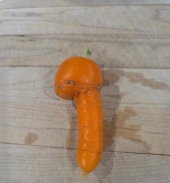


Timothy Norton wrote:I have chickens that I rotate between paddocks and am still learning when enough is enough in terms of grazing.
I have tried clovers with decent success, but the scratching tends to thin out the stands. I'm at the point where I'm planning on purchasing a cover crop mix and seeing how it tolerates the hens after it gets established. I am trying to remove some garlic mustard, creeping charlie, and a few other less prized plants at the same time.
What are some of your favorite forage plants?


Kristine Keeney wrote:In answer to some of the questions:
While 9 inches is something you do see, I have experimented; my flock seems to like a solid 12 inches per bird. Sometimes they'll all pack together to save heat, but they like to have the space to sit apart. More space is never a bad thing.
I've seen a "2-foot rule" being mentioned in perch spacing. The perches need to start at least 2 feet from the ground, and have rungs spaced about 2 feet apart if you're making a ladder-type perch, or a 2-foot space between perches to allow the birds a chance to sit without their heads in someone else's tail.
You could probably get away with less space between perches if your birds are smaller than the average full-sized chicken, but 2 feet seems reasonable for my flock.
It's also suggested that you stop perches somewhere below 2 feet of the top of your shelter, too.
I have made perches that were too close to the wire. My poor cockerels, who tried to roost there, just looked sad, all hunched over trying to avoid smushing their feathers and combs into the top of their shelter.
The 2-foot rule, or its equivalent in meters - .61meters, is a good one, even if it's very generic.

Stacie Bear wrote:Hello carrot lovers. I came across your question, being new here, and finding so many things to read! (endless amounts - HA!) Finally taking the time to respond to something for once! I appreciate this site! I only recently came across it.. wondering where this had been all my days! HA!


Ann Galloway wrote:Thank you for your post. We the People need to come together and support this kind of net working and community building. Are you getting groups together for alternative building methods, a community of helping and educating others. Ann 505 986-0568. I have been researching info requirements regarding moving to Montana. I am wanting to build 6 ft below the surface home and green house in a dome. There is a guy in Montana with an underground green house that was blind sided by gov. with a tremendous amount of requirements and expenses. Anyone have good deals on land and suggestions? I would love to hear from you.
Sincerely,
Ann

Joseph Lofthouse wrote:When I dig sunroots, I immediately wash them and store in plastic. Due to that, the skin stays soft and tender when I eat them, so I don't peel.

Joseph Lofthouse wrote:
To me, describing a cooked sunroot as "sharp" implies that cooking really brings out the flavor/aroma of sunflower resin. I don't much care for that flavor, so I prefer to eat them raw, lacto-fermented, or added in small amounts to roasts, stews, or stir-fries.

Inge Leonora-den Ouden wrote:Difficult to tell what was my best find. I don't 'dive' in dumpsters, but I always have a look at the larger things they put next to the garbage. I take (garden) chairs, baskets and (house)plants (still alive!) with me.
Most people I know (friends and family) don't just throw away stuff, if it's still in good shape. They first ask if others want to have it (mostly through app-groups). So I have curtains from friends who moved (to a house with different size/shape windows). And more.